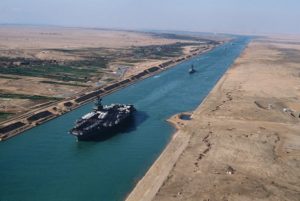March 5, 1957 The Suez Canal War
 After the withdrawal of the Israeli forces from the Sinai Prime Minister Ben-Gurion told the Knesset that the Sinai Campaign had been undertaken “to prevent an Egyptian war on Israel and its encirclement by its enemies.”
After the withdrawal of the Israeli forces from the Sinai Prime Minister Ben-Gurion told the Knesset that the Sinai Campaign had been undertaken “to prevent an Egyptian war on Israel and its encirclement by its enemies.”
“On the morning of 28 October, I submitted to the Government the plan for the Sinai operation. As I have already stated elsewhere, this was not a campaign of conquest but a campaign of deliverance.
“Like many others, I believed that the Czech-Egyptian arms transaction greatly intensified the danger to our security, and we made desperate efforts to acquire the minimum armament supplies required to deter the enemy, as well as other guarantees for our security. In the latter aim we were completely unsuccessful.
“On 15 October 1956, I reviewed in the Knesset our efforts to obtain arms, but I pointed out that, although we were not so defenseless as we had been at the beginning of the year – Egypt alone still has an enormous arms superiority over Israel both by sea and in the air, and even on land. She has destroyers and submarines, she has heavy tanks – British, Czech and Soviet – she has Soviet jet fighters and bombers superior in quality and quantity to anything we possess, and if we add the constantly increasing armament of the other Arab countries, we still have still more cause for anxiety.
“In those days the tri-partite military alliance between Egypt, Jordan and Syria was signed, the armies of these three countries were placed under Egyptian command, and their rulers openly declared that they could now choose the time to wipe out Israel. We realized that the enemy’s sword was not only hanging over our head but directed straight at our heart.
“A glance at the map of Israel is enough to show clearly the immediate danger that faced us in those days; sudden attack by these countries under Egyptian command could easily have cut the country in two at the narrow strip in the neighborhood of Natanya; our airfields and our two coastal towns, Jaffa-Tel Aviv and Haifa, where most of our population is concentrated, could have been bombed, thus obstructing the mobilization of reserves, which are the sole foundation of our security in view of the smallness of our regular army.
“Such interference with the mobilization of our reserves and the bombardment of our airfields would have left us helpless against the aggression – unless we had struck out first at the aggressors. And the Sinai Campaign became a condition for our very survival, and action in self-defense in accordance with Article 51 of the Charter of the United Nations. I am certain that any other people in our position would have acted likewise.
“In the course of five days, we defeated three Egyptian divisions in the Sinai and the Gaza Strip, we destroyed all the Fedayeen bases, and destroyed or captured large quantities of Egypt’s military equipment, including land, sea and air armament.
“The Sinai operation was essential, justified and worthwhile, if only for this reason alone, and I doubt if any army has achieved such great and important results with so few – through such precious casualties; 170 killed and 1 prisoner – as the Israel Defense Forces achieved in the Sinai operation. This was a campaign of deliverance, for it saved Israel from a direct and immediate danger, crippled the enemy’s aggressive capacity for no short period, and in my opinion inflicted a heavy blow on the prestige of the Egyptian dictator, who aims at dominating all the peoples of the Middle East, as well perhaps as the entire African continent. And had the Sinai operation given us no more than this – it would have been enough. It would have been justified …
“At the end of October in a single effort we broke through an ever-tightening ring into the open. The situation which prevailed before the Sinai operation will never return. We have not yet achieved peace and tranquility, nor shall we do so easily or soon. The way ahead of us is still long and difficult. Our struggle for Gaza and Sharm-el-Sheikh must be understood as stages in a prolonged process of consolidating our security, our international standing and our basic rights.
“But what was decisive for me was the needs of security and immigration and the hope of the development of the Negev and a free outlet to the Red Sea and Indian Ocean, though I am Keenly aware of the dangers and the drawbacks involved in the settlement we have made.”



